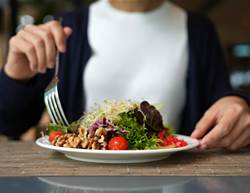There’s a lot of medical jargon around cholesterol and heart health, but it doesn’t have to be confusing. By making smart choices—like adding the best foods for healthy cholesterol levels to your diet and following your doctor’s advice—you can take big steps towards lowering “bad” low-density lipoprotein (LDL) cholesterol and boosting “good” high-density lipoprotein (HDL) cholesterol.
LDL cholesterol plays a key role in how clogged your arteries can become from a build-up of fat and other substances called plaque. The more plaque, the higher your LDL levels are likely to be, which makes it harder for your body to circulate blood and increases your risk of heart attack, stroke and blood clots.
“Studies have shown that dietary changes—especially lowering saturated fats, avoiding trans fats, increasing soluble fibre and including plant sterols/stanols—can significantly reduce LDL cholesterol by 5 to 30%, depending on adherence and genetics,” says registered dietitian Martha Theran.
Diet can help manage cholesterol by reducing the unhealthy fats you consume, but certain nutrients can also help your body repair some of the damage already done. “Increasing soluble fibre binds cholesterol in the gut and removes it from the body,” explains cardiologist Dr Deepak Talreja. Healthy fats, like those in nuts and seeds, can raise HDL levels and lower triglycerides—a type of fat that also contributes to heart disease. Phytosterols, found in plant foods, may block the absorption of LDL cholesterol, he adds. Replacing animal proteins with plant-based ones can also help you avoid cholesterol-raising fats found in fatty cuts of meat.
Foods to lower cholesterol
Experts recommend adding these foods to your diet to help lower cholesterol naturally and support heart health.
Oats and barley
These grains are rich in the soluble fibre beta-glucan, which binds to cholesterol in the gut and helps remove it from the body, says Theran. Start the day with a bowl of oats and use barley in dinner recipes, such as hearty soups, suggests Dr Talreja.
Lentils and beans
Packed with soluble fibre and plant-based protein, legumes slow digestion and reduce cholesterol absorption, says Theran. They can also help stabilise blood sugar, adds Dr Talreja, making them a great addition to salads, soups or wraps.
Fatty fish
Salmon, mackerel and sardines are high in omega-3 fatty acids, which lower triglycerides and may help raise HDL cholesterol, says Theran. Dr Talreja recommends aiming for at least two serves of fatty fish each week.
Nuts
Almonds, walnuts and other nuts contain heart-healthy unsaturated fats, fibre and plant sterols that can lower LDL cholesterol, says Theran. A small daily handful (about 30 grams) is enough to make a positive difference, says Dr Talreja.
Avocado
Rich in monounsaturated fats and fibre, avocado may lower LDL cholesterol without affecting HDL, Theran explains. Dr Talreja suggests swapping butter or cheese for avocado on toast or in sandwiches.
Olive oil
Extra-virgin olive oil is high in antioxidants and monounsaturated fats that help reduce inflammation and protect LDL cholesterol from oxidation—a process that leads to plaque formation, says Theran.
Apples, berries, citrus
These fruits contain pectin, a type of soluble fibre that binds to LDL cholesterol and helps remove it through the digestive tract, says Dr Talreja. Eating the skin where possible provides maximum fibre benefits.
Greens
Dark leafy vegetables and okra are especially good for cholesterol as they’re high in fibre, low in kilojoules and rich in plant sterols that block cholesterol absorption, says Theran.
Soy protein
Tofu, soy milk and edamame provide plant-based protein and isoflavones—plant compounds that may lower LDL cholesterol and reduce inflammation, says Theran. Try using tofu or tempeh as a meat substitute in stir-fries and grain bowls.
Green tea
Green tea is rich in catechins, antioxidants that help reduce cholesterol absorption and support healthy lipid levels, says Theran. Keep it heart-healthy by avoiding too much added milk or sugar.
Tomatoes
Tomatoes are a top source of lycopene, an antioxidant that may help prevent LDL cholesterol from oxidising, which can lead to plaque build-up in the arteries.
Chia seeds
Chia seeds are high in soluble fibre, which traps cholesterol in the gut to aid its removal from the body. They may also help improve HDL cholesterol levels.
The bottom line
“A heart-healthy diet that’s rich in plants, fibre and healthy fats—especially within a Mediterranean or plant-based eating pattern—is one of the most effective ways to lower cholesterol,” says Dr Talreja. “When paired with regular exercise, this approach offers the best chance of reducing cardiovascular risk and supporting a longer, healthier life.”










